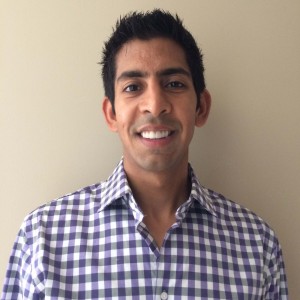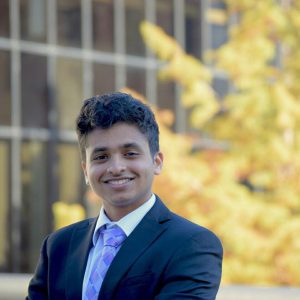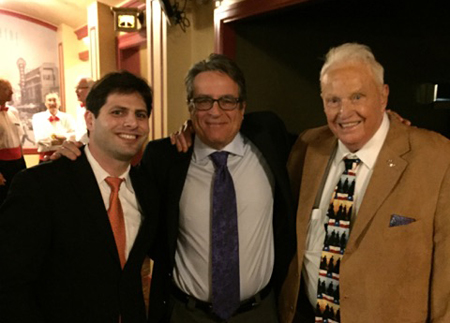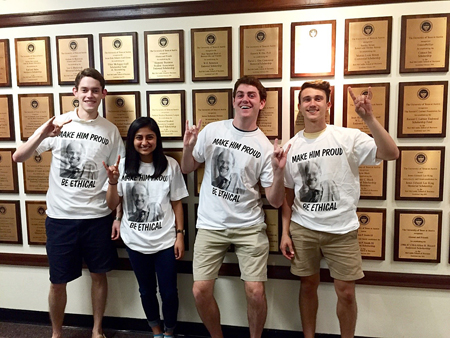 Vivek Shah, BHP 2003, will be honored with the McCombs Rising Star Award this coming Friday at the McCombs Hall of Fame dinner. The award is given to two McCombs alumni annually who have been successful professionally and have helped strengthen the McCombs Alumni Network. Vivek serves on the BHP Advisory Board and is the co-founder and managing director for Consortium Finance, based in San Francisco, where he manages $200 million of capital for investors.
Vivek Shah, BHP 2003, will be honored with the McCombs Rising Star Award this coming Friday at the McCombs Hall of Fame dinner. The award is given to two McCombs alumni annually who have been successful professionally and have helped strengthen the McCombs Alumni Network. Vivek serves on the BHP Advisory Board and is the co-founder and managing director for Consortium Finance, based in San Francisco, where he manages $200 million of capital for investors.
Take me through your career path since graduating and tell me more about the new company you founded, Consortium Finance.
Since graduating, the first company I worked for was Simmons & Company as an analyst for two years. My boss at the time left to join D.E. Shaw and called me a few months later and asked me to consider joining so I actually followed him there to the firm’s Houston office in 2005. There I was focused on direct investing in companies, everything from venture capital to private equity and lending across industries. At the time, I was in a long-distance relationship and my girlfriend at the time (my wife today) really wanted to be in California, so even though it was hard for me to leave Texas, D.E. Shaw wanted to open a SF office and I went out there to help open that office for the firm in 2006. I was there until 2012 investing directly in companies. D.E. Shaw decided to spin our group out into a new firm called Stellus Capital Management, so I ran the West Coast operations for Stellus from San Francisco. I always had a dream to have my own business; in 2013, I was fortunate to partner with my business partner to raise our own capital, which we were successful doing bringing on two investors, raising $100 million from each of them. This allowed us to start our own firm, Consortium Finance which is my primary focus today.
How has it been different for you running your own business?
There is a lot of healthy anxiety. I am dependent upon myself and my business partner to perform, but what we are really excited about is we have a substantial level of autonomy and transparency. We are a lean firm and there are no politics or organizational bureaucracies. We are having a ton of fun together and for me enjoying work is essential given most people spend almost 70% of their awake hours at work. I am excited about work every day and fortunate to be in such a situation. Things are within our control which is also unique, but with that also comes healthy anxiety.
What are the challenges and rewards of a career in investment management?
The challenges are you are investing other people’s money, so there is a lot of pressure in wanting to do the best possible job to generate positive returns for others. When you don’t have positive outcomes on investments, it is taxing emotionally and financially. The other challenge is that it is a very competitive business, so to set ourselves apart is difficult. It is rewarding in that we do have the ability when we perform well to generate returns for others that is allowing for creation of wealth that goes towards different purposes. There are also a lot of things occurring that positively affect the economy from the capital that we are providing for businesses.
How did you start lecturing at the University of California at Berkeley and what are you teaching there?
I have always been passionate about education. At one point I called and emailed about a dozen professors in the business school (Haas) at Berkeley and offered to teach and there was one professor who responded to me and took me under his wing. I helped him directly at first and then that exposure opened doors for me to do more. I have guest lectured on several occasions over there. I lectured on Hedge Fund investing and grad level micro-economics. I was also a supplemental lecturer for an undergrad intro to finance.
You co-founded EDge-UCATION a few years ago to develop a business curriculum for students. What has been the progress of that business and where are you headed with that endeavor?
The focus of it is to help students in business and other curriculums learn how to value companies, assess businesses, and learn how to be efficient in modeling in Excel. We actually came to UT and taught two classes at McCombs that were one-day, full-day lectures. We will be back this October to teach again. It stems from my passion for education and what I saw as a need to teach students practical skills that supplement what they are learning in class. When students are interviewing and taking on jobs, they are more prepared. We have taught in multiple universities. We aren’t really trying to grow it, it is just something I want to keep doing on the side to educate others.
You have volunteered to do admissions interviews for BHP for many years now. What do you enjoy most about interviewing applicants to the program?
I enjoy the discussion with future potential classes of the BHP. I hope these future classes are a good group and will take the program to the next level and reflect well on the brand of the program and the university. I enjoy assessing their capabilities and the value of what they might bring to the program. It is great to hear their background and stories and see how they might be a fit for the program.
Why do you think it is important for alumni to get involved with McCombs and BHP after graduation?
I attribute a lot of my personal success and the growth of my career to BHP and the business school, so I want to give back. It is easy to take things for granted and I try really hard to be cognizant of people, situations and experience that have led me to where I am today. With McCombs, the education I received was unparalleled and was critical in my personal development.
What advice do you have for current BHP students?
Follow your passion and in whatever you do, give it your personal best. Always give what you do 110%. Don’t regret any mistakes or misfortunes. Try not to repeat them and try to learn from them. I have had a lot of challenges professionally and personally. Everyone has their own unique set of problems and all things really do heal with time. From every tough experience, there is something to be learned from it. Something I have learned personally is that a genuine level of internal happiness comes from overcoming challenges, rather than getting something really easily. If you work hard to achieve it, you have a different level of appreciation for it.





